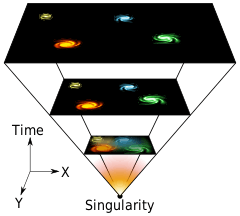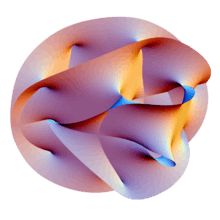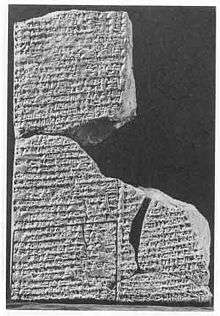Cosmogony
Cosmogony (from the Koine Greek Greek: κοσμογονία (from Greek: κόσμος "cosmos, the world") and the root of γί(γ)νομαι / γέγονα ("come into a new state of being")) is any model concerning the origin of either the cosmos or the universe.[1][2][3]
Overview
Scientific theories

In astronomy, cosmogony refers to the study of the origin of particular astrophysical objects or systems, and is most commonly used in reference to the origin of the universe, the Solar System, or the Earth–Moon system.[1][2] The prevalent cosmological model of the early development of the universe is the Big Bang theory.[4] Sean M. Carroll, who specializes in theoretical cosmology and field theory, explains two competing explanations for the origins of the singularity, which is the center of a space in which a characteristic is limitless.[5] An example of this is when the black hole reaches a point of singularity and gravity, as the characteristic of this space becomes boundless. It is generally accepted that the universe began at a point of singularity, and when the singularity of the universe started to expand, the Big Bang occurred, which evidently began the universe. The other explanation, held by proponents like Stephen Hawking, asserts that "time" did not exist when it emerged along with the universe. This assertion implies that the universe does not have an origin story. Time did not exist "prior" to the creation of the universe. Hence, it is unclear whether properties such as space, or time emerged with the singularity and the universe as it is known.[5][6]
Despite the research, there is currently no theoretical model that explains the earliest moments of the universe's existence (during the Planck epoch) due to a lack of a testable theory of quantum gravity. Nevertheless, researchers in string theory, its extensions (see M theory), and of loop quantum cosmology like Barton Zwiebach and Washington Taylor, have proposed solutions to assist in the explanation of the universe's earliest moments[7] Cosmogonists have only tentative theories for the early stages of the universe and its beginning. The proposed theoretical scenarios include string theory, M-theory, the Hartle—Hawking initial state, string landscape, cosmic inflation, the Big Bang, and the ekpyrotic universe. Some of these proposed scenarios, like the string theory, are compatible; whereas, others are not.[8]

Mythology

Cosmogony does not only relate to scientific theories, but also has connections to the humanities, more specifically creation myths. Creation, or cosmogonic myths, explain the creation of the universe or the cosmos by either
- a supreme being, or beings,
- the process of metamorphosis,
- the copulation of female and male deities,
- through chaos, or
- via the cosmic egg (also known as world egg).[10]
Before cosmogony had roots in scientific theories, creation myths were used to provide explanations for the origin story of the universe. For instance, Eridu Genesis, the oldest known creation myth founded on Sumerian tablets, reveal how the epic concerned itself with the creation of the world, formulating of cities, and a great flood. The universe was created out of the primeval sea (see also Abzu), and thus, the gods are created and men were created to tend to nature.[11][12] Creation myths vary, but they may share a similar deity or symbol. For instance, the ruler of the gods in Greek mythology, Zeus, is similar to the ruler of the gods in Roman mythology, Jupiter (Jove).[13]
The term, myth, is generally regarded as referring to stories that are fictional and purely for entertainment. However, myths help give historians and researchers insight into the theological practices and traditions of these cultures and thus, as literary critic and theorist Northrop Frye understood, exemplifies the significant importance of myths'.[13][14]
Compared with cosmology
Cosmogony can be distinguished from cosmology, which studies the universe at large, its existence and does not inquire directly into the source of its origins. Yet, there is little ambiguity between cosmogony and cosmology in terms of the humanities. For instance, the cosmological argument from theology regarding the existence of God is an appeal to cosmogonical rather than cosmological ideas. However, in practice, there is a scientific distinction between cosmological and cosmogonical ideas.[15] Physical cosmology is the science that attempts to explain all observations relevant to the development and characteristics of the universe as a whole. Questions regarding why the universe behaves in such a way have been described by physicists and cosmologists as being extra-scientific (i.e., metaphysical), though speculations are made from a variety of perspectives that include extrapolation of scientific theories to untested regimes (i.e., at Planck scales), and philosophical or religious ideas.[6][15][4]
References
- Ridpath, Ian (2012). A Dictionary of Astronomy. Oxford University Press.
- Woolfson, Michael Mark (1979). "Cosmogony Today". Quarterly Journal of the Royal Astronomical Society. 20 (2): 97–114. Bibcode:1979QJRAS..20...97W.
- Staff. "γίγνομαι – come into a new state of being". Tufts University. Retrieved 17 September 2014.
- Wollack, Edward J. (10 December 2010). "Cosmology: The Study of the Universe". Universe 101: Big Bang Theory. NASA. Archived from the original on 14 May 2011. Retrieved 27 April 2011.
- Carroll, Sean (28 April 2012). "A Universe from Nothing?". Science for the Curious. Retrieved 22 April 2019.
- Carroll, Sean; Carroll, Sean M. (2003). Spacetime and Geometry: An Introduction to General Relativity. Pearson.
- "String Theory/Holography/Gravity". Center for Theoretical Physics. Retrieved 20 April 2019.
- Becker, Katrin; Becker, Melanie; Schwartz, John (2007). String Theory and M-Theory. Cambridge, UK: Cambridge University Press.
- "A Universe from Nothing?, by Sean Carroll, Discover Magazine Blogs, 28 April 2012". 28 April 2012. Retrieved 3 October 2014.
- Long, Charles. "Creation Myth". Encyclopedia Britannica. Retrieved 20 April 2019.
- "Eridu Genesis Mesopotamia Epic". Encyclopaedia Britannica. Encyclopaedia Britannica, Inc. 20 July 1998. Retrieved 30 April 2019.
- Morris, Charles (1897). "The Primeval Ocean". Proceedings of the Academy of Natural Sciences of Philadelphia. 49: 12–17. JSTOR 4062253.
- Thury, Eva; Devinney, Margaret (2017). Introduction to Mythology Contemporary Approaches to Classical and World Myths, 4th ed. Madison Avenue, New York: Oxford University Press. pp. 4, 187.
- Gill, Glen (2006). Northrop Frye and The Phenomenology of Myth. Canada: University of Toronto Press.
- Smeenk, Christopher; Ellis, George (Winter 2017). "Philosophy of Cosmology". Stanford Encyclopedia of Philosophy. Retrieved 30 April 2019.